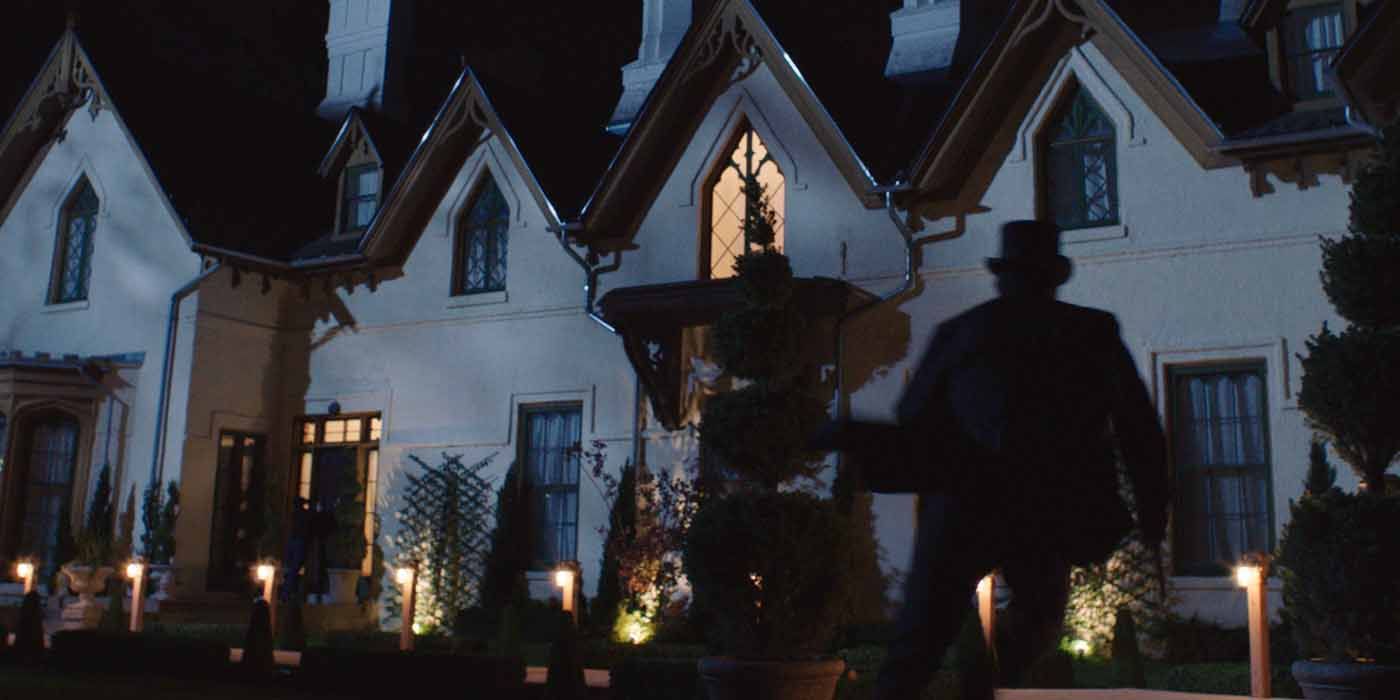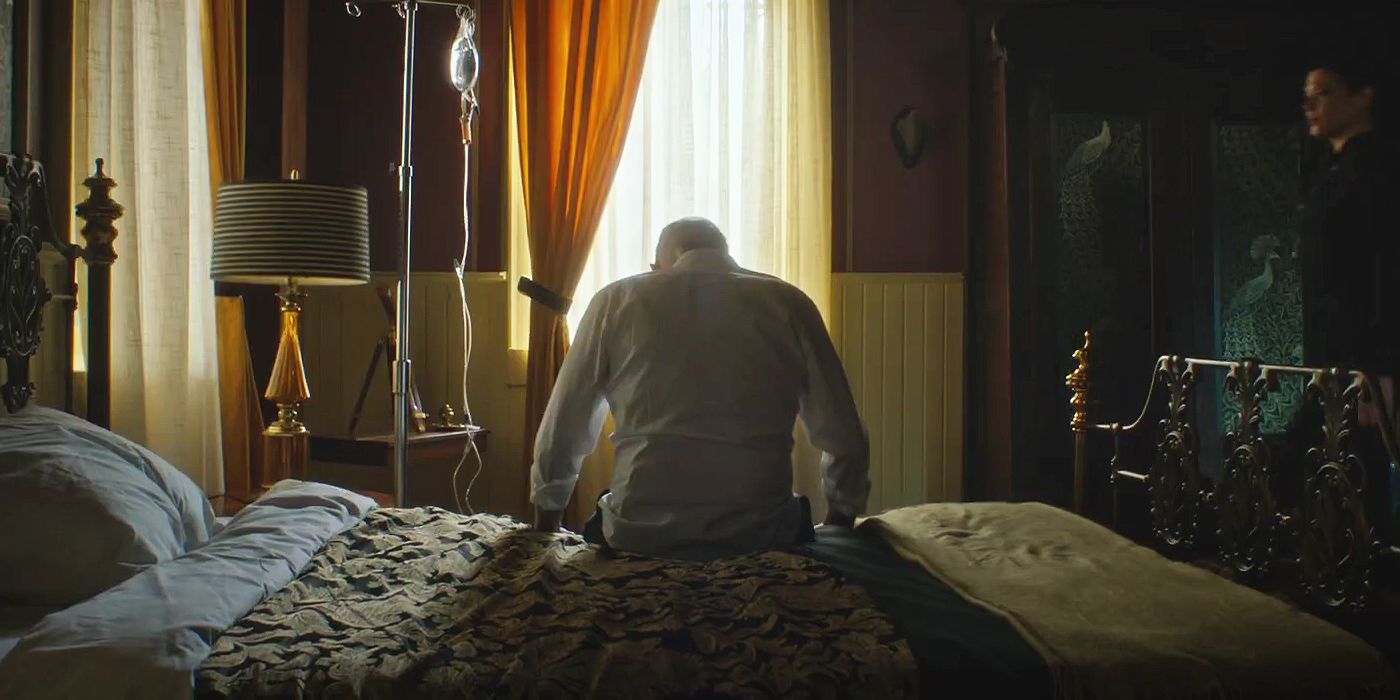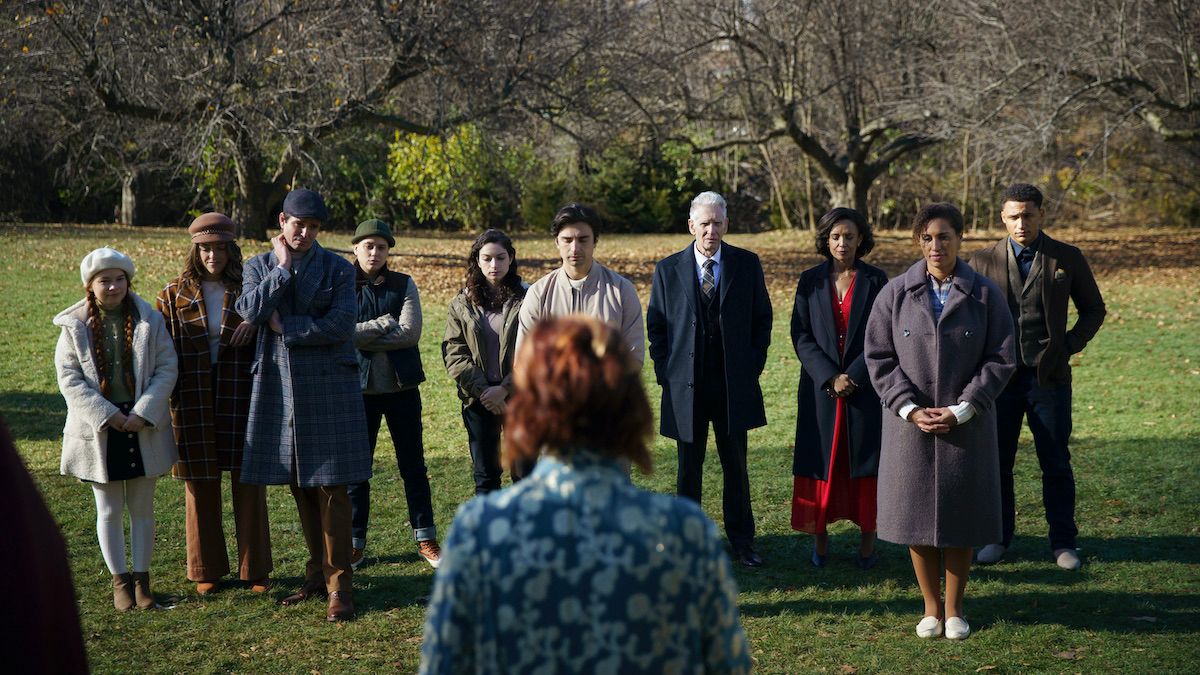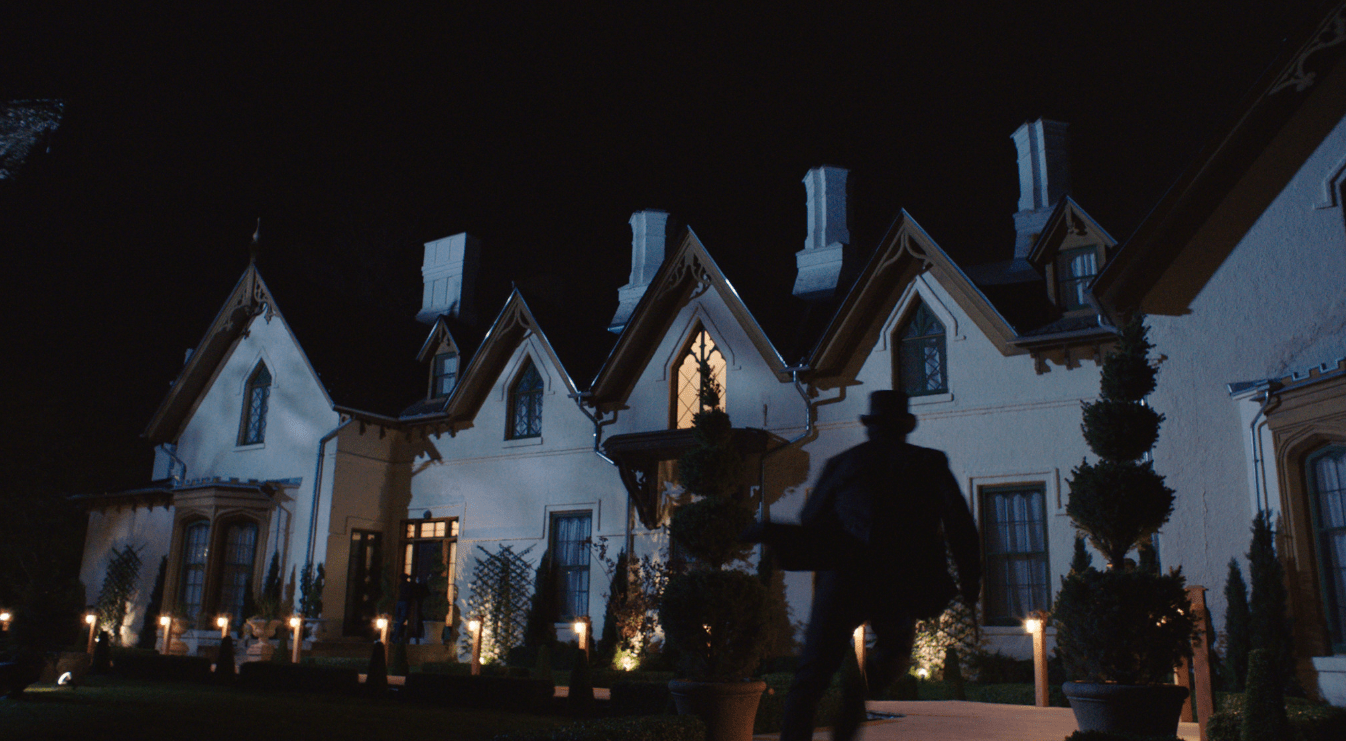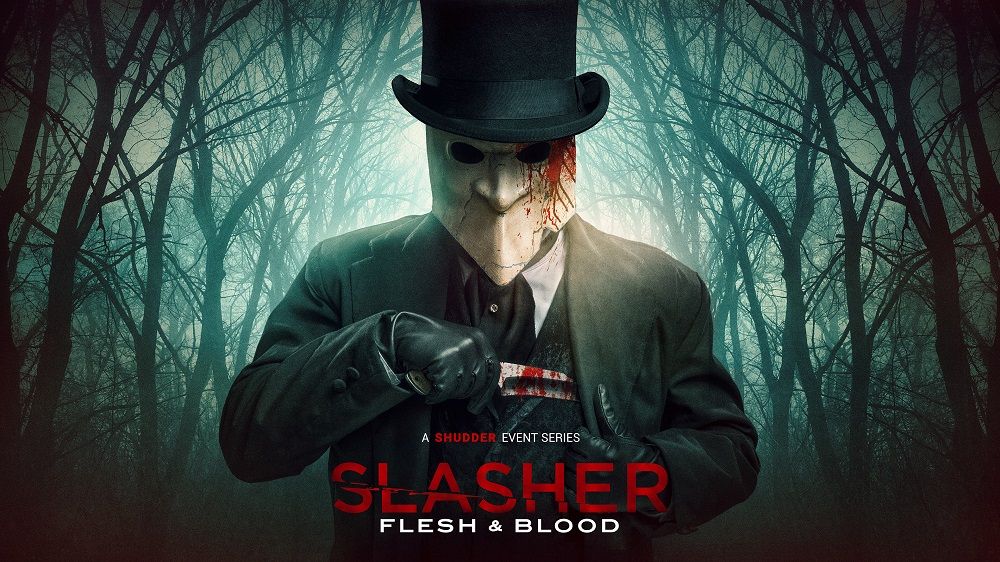The acclaimed horror anthology series Slasher is arriving on Shudder just in time for its fourth season debut. Teasing even bloodier mayhem, Season 4's Flesh & Blood follows the dysfunctional Galloway family convening at the remote island estate of patriarch Spencer Galloway, portrayed by legendary filmmaker David Cronenberg, as he has them compete for the family fortune. As the competition escalates, things take a gruesome turn. Old wounds reopen and rivalries turn murderous, picking off the Galloway family one by one.
In an exclusive interview with CBR, series creator Aaron Martin and showrunner Ian Carpenter shared Season 4's origin story, the natural theatrical and whodunnit sensibilities inherent to the season's premise, and what it was like to work with Cronenberg.
As a lifelong horror fan and someone who saw The Fly way too young, how was it getting to work with the father of body horror David Cronenberg on this season of Slasher?
Ian Carpenter: That's an interesting story... I wrote an email to him talking about how important his movies were for me. I had grown up with them and Videodrome is one of the top three most-watched films for me, it's enormous. We both went to the same university, we were both science students before we did all this stuff and I had always seen him, as a young science student, and secretly wanted to do that, he was someone who was blazing a path. He responded to that and to a Zoom that [director] Adam MacDonald and I had with him and he really, really enjoyed the material -- which he's said in interviews so I can repeat that -- but working with him was amazing. I think for everyone on set, it suddenly made it feel like a big deal: Cronenberg thinks this is good enough to spend just shy of a month, because it's a huge part, on this.
Aaron Martin: A month during a pandemic!
Carpenter: You watch that affect the entire crew and older fans all know him and I have no sense of how important he is for younger people and it was amazing because I would have wardrobe calls with some of the young actors and go, "Has anyone told you who [plays] your father?" I'd tell them and they'd freak out, having trouble breathing as they were standing around going, "Are you serious?!" It was big for everyone and he's very serious, of course. Not in a way that's a drag but he's there to work, focused on it, and has incredible stories, when you're between takes, about people like Viggo [Mortensen]. It was a real pleasure, he was a pleasure to be around and just brings a great mood to the set.
Martin: When I came up with the idea for this series, it was based in '80s slasher movies and the stuff that preceded that... I remember watching Rabid as a teenager and one of my friends was so nauseated by the underarm mouth that she couldn't go to school for two days. The body horror is such a big part of Slasher that it's amazing just to have that impressive mind bringing our show to life.
I love that this season feels like an Agatha Christie story but only in the way Slasher could do it, with people getting literally ripped apart and people stuck together like a chamber play getting picked off one-by-one. How was it developing the story for this season?
Martin: We had been given development money after Season 3 around Christmas and it was right after I spent Christmas with my own family. I love them, they're amazing, but after spending a week with them, I wanted to kill them. When we were talking about Season 4, we were like what if you took the idea of a family dynamic and just make it so extreme that they are actually killing each other. For me, the idea of Agatha Christie is exactly where I started the show from. It's called Slasher and obviously, there's always going to be a slasher element but it was also informed by murder mysteries, especially Agatha Christie, when I came up with the concept.
Carpenter: There's that great quote by Eckhart Tolle where he says something like, "You think you're evolved? Go spend a week alone with your family." It's brutal and I feel like you see that trickling into what's going on in the story: When you're alone, you're a completely independent person, maybe a different personality to an extent, and go you home and drop into these terrible roles; when [family] is here, you're sucked into these old habits.
Where did the idea of the more physical component to this season, with the family competing in field games before escalating quickly into something more Slasher-appropriate come into play?
Martin: We wanted it to be a competition for one man's fortune and really play out physically the kind of in-fighting that naturally happens to begin with. It's something the family had always been doing for smaller prizes and we figured that this should be the ultimate prize.
Carpenter: We spent a lot of time talking about different generations, certainly around the conception of this, and that also leads to different parenting styles. We were definitely interested in that older parenting style that Spencer brings that also has a murky history of if he's from Great Britain, which we both have at least one parent from, and there is definitely that tough approach to parenting. We were very interested in what that could do to you and watching it trickle down to see what those [younger] parents are like, that sense of survival of the fittest was very interesting to explore through a family.
Martin: And the idea that just because a patriarch made a fortune doesn't mean his kids are all equipped to keep that fortune going.
Four seasons in, how do you keep finding creatively gruesome ways to dispatch your cast members?
Martin: That's the fun part! We developed most of this last season on Ian's porch because of the pandemic and we were outside and would go on walks around his neighborhood talking about how we'd kill people. I assume people would walk past us and be terrified because we're both big and hairy guys talking about how we'd kill someone by throwing them in something. The kills are usually borne out of the theme of the episode so it helps us hone in on how we can physicalize what we're talking about in that episode and it usually brings us a really cool way of killing somebody.
Carpenter: It's so much fun! [laughs]
To get logistical, how has the jump to Shudder been for this season?
Carpenter: It's good! You can't beat this team in their rabid love of horror and in the depth of knowledge. I would put myself as a moderate horror fan, in consumption of horror, just because there's a lot of other things I love as well; but, it's incredible with the conversations when we're going through a notes process developing things, the number of films and shows being brought up. And then you go watch it and you're like, "Holy smokes, is that amazing!" It is the home for horror and for very good reason: They know it deeply, it's very interesting and they know their audience so well. At a couple of points in the process, they would go, "Our audience is going to know that!" And that was great. It was great to be working with people who knew all those things that well.
To go macro, what do you personally find fulfilling to keep working in the horror genre?
Martin: Every season, we're building the show around a specific theme. Horror works best when it's talking about contemporary issues and we really strive to do that. Season 3 was about the internet and how quickly things can explode. This season is really about family dynamics and the rich-poor divide that's happening in the world and generational problems. Each season, we're allowed to do our own essay on what interests us and we're allowed to do it in a fun and crazy way because we're allowed to kill people.
Carpenter: It's a great crucible to talk about anything, through life and death.
Martin: The other great thing is that we get to shift the look of the show every season too because it's not an ongoing thing. This season's visual references were the films of Douglas Sirk because, early on in the pandemic, I was just watching old movies and really fell in love with how beautiful his movies are. It's always really good to juxtapose the look of a show with the content of a show.
With this season, in particular, you lean more into theater sensibilities with more characters present in a given scene and a more limited set -- a sort of Grand Guignol set on a remote island. How was it leaning into that?
Carpenter: I love that you've mentioned the Grand Guignol and chamber plays and are talking about it in that way. I had those thoughts while watching us shoot them and I have a history in theater from around fifteen years ago but, for me, it was an after-effect of us talking on the stage shooting it.
Martin: I think it's beyond my brain so it wasn't something I was talking about. [laughs]
Carpenter: But I love that you're seeing it that way. I think you're right but sometimes those are things that creep in. This is the fun moment for us where people like you, who are smart and are starting to talk about it and seeing things in there that I think are legit there.
Just to close out, what can you tease for audiences about Slasher: Flesh & Blood?
Martin: The definite tease is that the kills are even more excessive than we did in Season 1 and 2, we've raised it a huge notch. There's one kill that I think is the most upsetting in the whole life of the show.
Created by Aaron Martin, Slasher: Flesh & Blood is streaming on Shudder, with new episodes released on Thursdays.

